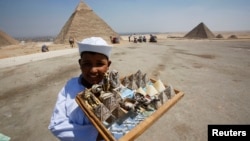CAIRO, EGYPT —
The Gulf Arab state of Kuwait will deposit $2 billion in aid in Egypt's central bank next week, the Egyptian central bank governor said on Wednesday.
Hisham Ramez told the Al Arabiya television network the money would stay in the central bank for five years.
A political crisis that began when the army overthrew Islamist President Mohamed Morsi on July 3 has hammered Egypt's economy.
In July, Kuwait pledged to provide $4 billion in aid to Egypt, matching pledges by Saudi Arabia and the United Arab Emirates that showed Gulf Arab approval of the Egyptian army's ousting of Morsi.
Kuwait's state news agency said the package would comprise a $2 billion central bank deposit, a $1 billion grant and $1 billion in oil products.
Kuwait has in the past cooperated with Riyadh and Abu Dhabi in offering financial aid for Gulf neighbors hit by social unrest such as Bahrain and Oman, and also for Morocco and Jordan. Gulf Arab states view Morsi's Muslim Brotherhood with deep suspicion.
The aid from the three Gulf Arab oil producers is expected to help Egypt avoid a balance of payments crisis and overcome fuel shortages that partly caused a wave of public anger against Morsi.
It will also ease pressure on Cairo to conclude long-running talks with the International Monetary Fund on a $4.8 billion loan. But a surging fiscal gap will remain a pressing challenge for the Egyptian government, analysts say.
Hisham Ramez told the Al Arabiya television network the money would stay in the central bank for five years.
A political crisis that began when the army overthrew Islamist President Mohamed Morsi on July 3 has hammered Egypt's economy.
In July, Kuwait pledged to provide $4 billion in aid to Egypt, matching pledges by Saudi Arabia and the United Arab Emirates that showed Gulf Arab approval of the Egyptian army's ousting of Morsi.
Kuwait's state news agency said the package would comprise a $2 billion central bank deposit, a $1 billion grant and $1 billion in oil products.
Kuwait has in the past cooperated with Riyadh and Abu Dhabi in offering financial aid for Gulf neighbors hit by social unrest such as Bahrain and Oman, and also for Morocco and Jordan. Gulf Arab states view Morsi's Muslim Brotherhood with deep suspicion.
The aid from the three Gulf Arab oil producers is expected to help Egypt avoid a balance of payments crisis and overcome fuel shortages that partly caused a wave of public anger against Morsi.
It will also ease pressure on Cairo to conclude long-running talks with the International Monetary Fund on a $4.8 billion loan. But a surging fiscal gap will remain a pressing challenge for the Egyptian government, analysts say.





